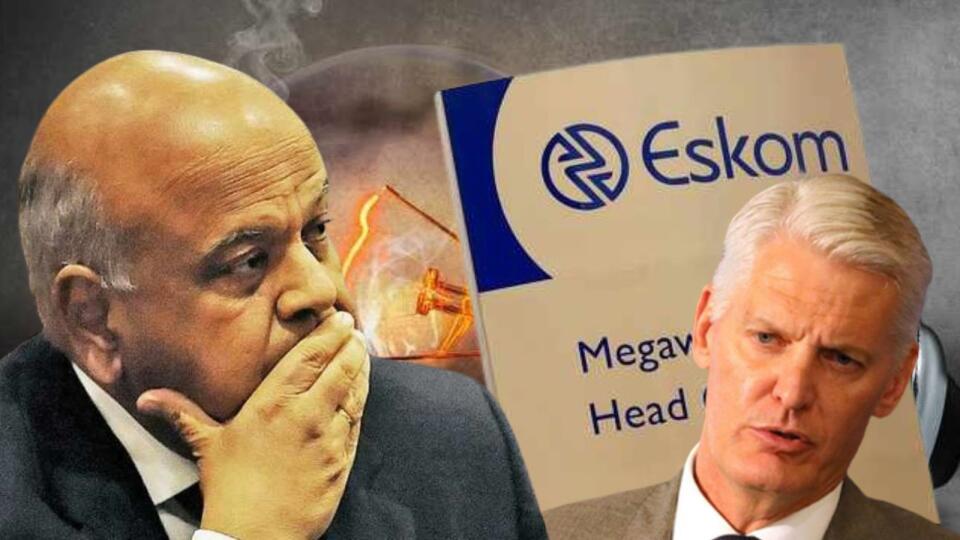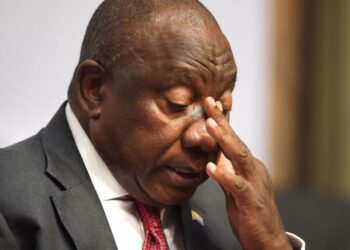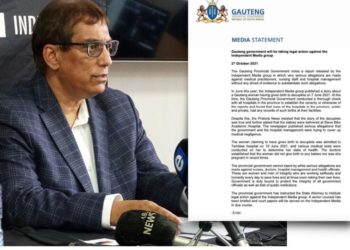“The harsh reality on the ground is that De Ruyter does not have what it takes to make a dent in the numerous issues faced by Eskom. This is no indictment against him but is more a reflection of the political decision-making of Gordhan, who clearly abused his power in pushing for someone with no electricity generation background.”
By Masibongwe Sihlahla
It was with great fanfare that some South Africans welcomed Andre de Ruyter as chief executive of Eskom – even as we were aware that he had no electricity background but came with a large fount of experience and a skill-set fully enabling him to take on such a challenging job.
In hindsight now that he has been two years into the job, it has become manifestly clear that as he did not know the lay of the land in terms of Eskom he is hampered down to overcome the challenges of supplying South Africa with a sustained and continuous stream of electricity.
It is with no small measure that he has laid bare the many small fiefdoms of corruption by various power station managers and he has achieved tremendous success in this regard as it is very difficult to pin down any specific problem in the huge behemoth that his Eskom. The budget of Eskom is so huge it’s larger than some small African countries.
De Ruyter has streamlined a lot of operational matters insofar as management is concerned, but unfortunately for South Africa his level of expertise and his skill-set is limited to management systems.
Unfortunately, Eskom, as the largest generator of electricity in Africa, needs a person at the helm who has a background in electricity generation and should have grown organically from the ground as there are management and operational challenges unique to Eskom that would not be found in any other company in South Africa.
Given time, I am sure De Ruyter would grow to become familiar with all aspects of Eskom. Unfortunately for South Africans, we do not have the luxury of time to afford that. It has become manifestly clear that Eskom is in need of a person with an electricity generation background in terms of technical skills, which are one of the most frequent operational challenges daily at Eskom.
Lack of technical know-how
Although having a great management team with him, the fact is that De Ruyter is hamstrung by the fact that he has a lack of technical know-how in terms of generation at Eskom.
The many problems cropping up from generational problems present unique management challenges which only a person with the necessary experience and expertise can counter with the necessary foresight. That unfortunately is not the situation on the ground in terms of the skill-set Andre de Ruyter is bringing to Eskom.
As a great, ethical and very competent leader, the harsh reality on the ground is that De Ruyter does not have what it takes to make a dent in the numerous issues faced by Eskom.
This is no indictment against him but is more a reflection of the political decision-making of Public Enterprises Minister Pravin Gordhan, who has clearly abused his power in pushing for someone with no electricity generation background.
When a head for Eskom needs to be appointed there needs to be a panel discussing the criteria which is submitted to the minister. The minister as the political head of the department in terms of the law only approves the process and does not intervene as it is an operational matter and not a policy matter.
Gordhan, unfortunately, is either one of those ministers who abuses his power or he has no idea what his role as minister in charge of Eskom is supposed to be.
A minister’s role is policy oversight, to ensure that government policy is implemented – as simple as that. However, sadly in South Africa we are infected with a disease, by ministers, of political interference in operational matters. This is where the rot sets in and is just a form of corruption as it involves abuse of power.
Uncomfortable questions
Why AfriForum has never raised this issue in public – as it’s an issue that is as clear as daylight – is a mystery only they can elucidate on. The problems at Eskom can thus be laid right at Gordhan’s door and its time we the public start to ask the uncomfortable questions.
Pravin is a much-beloved minister who induces great confidence in many South Africans but the harsh reality is that what we see in the appointment of De Ruyter was clear abuse of power by the minister to the detriment of the South African taxpayer and the country’s economy.
If only ministers knew what their true roles are as ministers we could go a long way to improving our economy and our state-owned entities (SOEs).
We see at Transnet once again the hand of Gordhan pushing for chief executives who are clearly inexperienced and lack the right skill-set. It’s clear he wants to ensure that the chief executives that head up the SOEs are beholden to him. What a fragile ego he must have.
Gordhan has no expertise or experience in appointing a chief executive of a large company such as Eskom and would have complete diffidence to the complex procedures which is necessary in such a process and yet he found it kosher to involve himself in this.
Lack of strategic planning
What is clear at the moment at Eskom is there is a total lack of strategic or operational planning, which is from the top down.
Any of the past chief executives who had started from the workshop up at Eskom would tell you that for any functional systems to be successful one must start at the top of Eskom functions – that is the executive level.
With the dawn of the new South Africa, unfortunately, a reverse process was initiated where input is required from the workshop floor up, whether it is the person seeing to the conveyor belting is operating at optimum level or whether it is the person monitoring the boilers, and then work its way up the vertical hierarchy.
For De Ruyter to implement democratic decision-making is to abdicate responsibility as it is the chief executive and his executive team who bear responsibility for the direction that Eskom takes.
From the way things are unfolding it is clear that the chief executive has indeed abdicated his responsibility for the current direction Eskom is taking. The manner in which the unprotected strike has been managed is just one example of this abdication of responsibility.
When we as taxpayers, the owners of Eskom in theory, want to know why things are going awry at Eskom, the last thing we want to hear is that a decision was taken collectively with input from the shop floor. What a lot of bull!
Silence is golden
It is true that silence is golden, but Gordhan did not heed these words when he addressed the media on June 28, where he made a lot of revealing statements clearly giving the impression that the ministry itself is clueless as to what is going on.
He mentions nonsense such as Level 6 being used in 2017, and he makes nonsense statements such as load shedding is not something new. What a load of rubbish!
Instead of making quantitive statements based on graphs, forms, bar charts, matrices and sheets of numbers, he descends to the level of making useless qualitative statements, a clear give-away that he is clueless and only held a media conference for the sake of hogging the limelight in the hope of people thinking he is still relevant.
It is clear that De Ruyter’s strategy to consult from the bottom up is failing as anyone knows that if you consult your floor managers to middle managers, all of them will sketch a rosy picture. It is clear that Andre de Ruyter has not seen the wood for the trees, hence we find that Eskom is going from bad to worse as time progresses and instead of giving a glimmer of hope they talking about level 8 of load shedding.
I do not blame De Ruyter for this as he was appointed through the interference of the minister and not in terms of a strategic thinker, but he does not understand the lay of the land and the culture of operations at Eskom.
I blame Gordhan squarely for the mess we are in and without realising it he admitted to it if you read between the lines of his press conference. If De Ruyter must go then there is no way he must take the fall alone – Gordhan must go too.
Masibongwe Sihlahla is an independent writer and political analyst. The views here are his own.
















